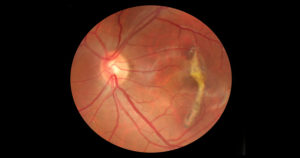INDULGE YOUR HEALTH BY INGESTING PRODUCE WITH RED, ORANGE, AND DARK GREEN COLORING… TO GOOD HEALTH!!!
Carotenoids Benefit Our Eyes
by Beth Levine
 As a child, you may have been reminded to eat up your carrots to improve your nighttime vision. While there is no proof at all that carrot consumption can sharpen your ability to see in the dark (actually a myth begun during World War II), there is a great deal of evidence that eating carrots may better the health of your eyes as an adult. New research suggests yet again that these vegetables, among others, might help prevent macular degeneration.
As a child, you may have been reminded to eat up your carrots to improve your nighttime vision. While there is no proof at all that carrot consumption can sharpen your ability to see in the dark (actually a myth begun during World War II), there is a great deal of evidence that eating carrots may better the health of your eyes as an adult. New research suggests yet again that these vegetables, among others, might help prevent macular degeneration.
The study, which was conducted at the Harvard T.H. Chan School of Public Health in Boston, found that eating foods such as carrots that are rich in carotenoids may offer some protection from age-related macular degeneration (AMD), a common cause of vision loss in older people. The subjects were 63,443 women and 38,603 men who took part in the Nurses’ Health Study or the Health Professionals Follow-up Study for more than two decades. All of the participants were at least 50 years old when their involvement began in either 1984 or 1986 and continued until 2010.
Over the course of the years, the volunteers were tracked; approximately 2.5 percent of them developed cases of macular degeneration that were intermediate to advanced. Intermediate macular degeneration is often asymptomatic but there may be some vision loss, and advanced macular degeneration is characterized by severe damage to the macula and vision loss that may be extensive.
As the scientists analyzed the data from the questionnaires, they discovered that the subjects who had the highest consumption levels of two carotenoids in particular–lutein and zeaxanthin–had a 40 percent lower risk of a diagnosis of advanced macular degeneration versus their peers who had the smallest intakes. Other forms of carotenoids were found to be quite beneficial as well. Greater levels of consumption of beta cryptoxanthin, alpha carotene, and beta carotene were all associated with a 25 to 35 percent lower risk of advanced AMD compared to those who ate very little of these carotenoids. But surprisingly, none of the carotenoids focused on in this study were determined to be linked to lower rates of the intermediate form of macular degeneration.
The research was not entirely flawless, as the surveys the participants answered were dependant on their recall of meals over time, which is not the most reliable and accurate source of information. In addition, the volunteers were never tested to measure carotenoid levels in their bodies, which could have validated their stated intakes.
Despite these issues, however, the large size of the population sample and the correlation to similar findings in other investigations (such as a 2006 study at the University of Wisconsin, Madison that showed lutein and zeaxanthin did indeed protect from intermediate AMD in women) add value to these results. Plus, considering that carotenoids have been associated with immune function support and lowering the risk of cancer and heart disease, it seems to be a no-brainer that we should all be increasing our consumption.
So where can we get adequate levels of carotenoids to make an impact on our eye health? As with many nutrients, the best place to start is in your diet. Different carotenoids are found in different foods, but in general they are often present in produce with red, orange, or dark green coloring. Good sources of lutein include kale, red pepper, and spinach. Zeaxanthin is found in orange pepper and corn. And some foods rich in cryptoxanthin, alpha carotene, and beta carotene are pumpkin, papaya, carrot, and sweet potato.
It’s important to eat a wide variety of fresh produce and in particular those with the most colorful hues. Everyone should strive to eat between five and nine servings daily of fruits and vegetables. If you don’t come anywhere near that, as many people do not, just introduce more servings into your diet a little at a time. It will add up to a big difference eventually and help your body fight off diseases of all kinds, including those that can steal your vision as you age. Then again, Jon Barron’s Ultimate Antioxidant, which has been available for over a decade, contains all of the aforementioned carotenoids: alpha carotene, beta carotene, beta cryptoxanthin, lutein, and zeaxanthin in one formula.
Article source: Baseline of Health Foundation




